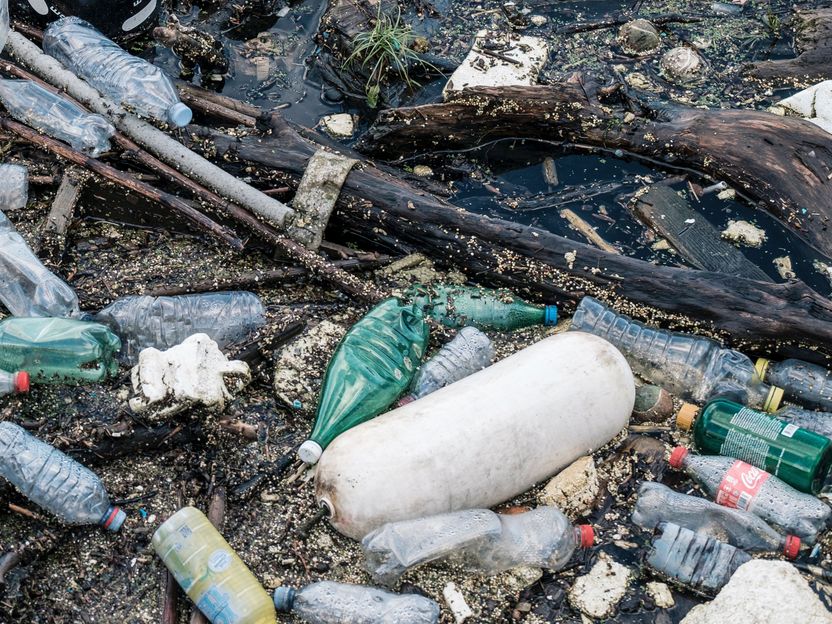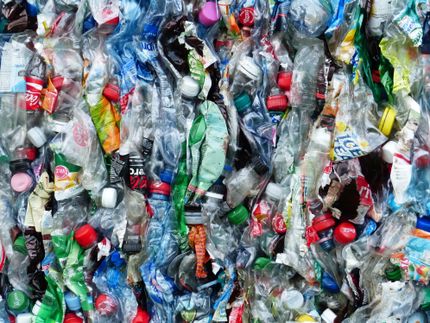Coca-Cola, Nestlé and Danone disclose for the first time how much plastic they use
DUH demands consistent conversion to reusable bottles
Advertisement
Coca-Cola, Nestlé and Danone have disclosed for the first time how much plastic they produce. In a report by the Ellen MacArthur Foundation, the extent of plastics consumption by the world's largest beverage manufacturers becomes clear. The global market leader Coca-Cola is the biggest plastic sinner with an annual production of three million tonnes of plastic, followed by Nestlé with 1.7 million tonnes and Danone with 750,000 tonnes. According to the German Environmental Aid (DUH), the figures show that the three beverage giants are among the main actors responsible for the pollution of the environment by plastic waste. The mass production of disposable plastic bottles wastes limited resources, pollutes the climate and leads to huge amounts of waste.
The DUH calls on Coca-Cola, Nestlé and Danone, who predominantly use disposable plastic bottles, to end the plastic madness and to bottle their drinks in environmentally friendly reusable bottles. Companies must also advocate deposit systems worldwide to ensure that beverage packaging is returned to retailers and not disposed of in the environment. The DUH also requires other companies such as Pepsi, Aldi or Lidl to disclose figures on plastics production.
"The plastic consumed by Coca-Cola produces an unimaginable volume of more than 88 billion disposable plastic bottles every year. That's 167,000 bottles a minute. Put together, the plastic bottles produced worldwide by Coca-Cola in one year would circumnavigate the earth 594 times or reach from the earth to the moon and back 31 times. Disposable bottles are among the most frequently disposed of packaging in the environment, especially in countries that do not have a deposit system, and lead to the death of thousands of living creatures. Bottle rings and lids are particularly frequently found in the stomachs of seabirds," criticizes Barbara Metz, Deputy Federal Managing Director of the DUH.
"Instead of acting sustainably and relying on environmentally friendly returnable bottles, Coca-Cola is pushing ahead with its global strategy for disposable plastic bottles and beverage cans. A Coca-Cola internal strategy paper published by DC-Leaks in 2016 shows that the company is fighting against returnable bottles, higher legal recycling rates and more collected plastic bottles," says Thomas Fischer, DUH's Director of Environmental Services.
In Germany, Coca-Cola is continuing its efforts to exit the returnable system. The 0.5 and 1.5 litre PET returnable bottles have already disappeared from the shelves and the company has already closed seven German locations in Germany since 2015. "For its own profit, Coca-Cola accepts the damage done to our environment, dismisses its employees and forces consumers to buy its disposable plastic bottles. In addition, Coca-Cola is undermining the reusable quota of 70 percent from the Packaging Act," Fischer continues. The company did not reply to a current enquiry by the DUH regarding the reusable portion and Coca-Cola's contribution to meeting the reusable portion of 70 percent applicable in Germany.
At the request of the DUH, Danone informed the DUH in writing that it would continue to focus on disposable plastic bottles and focused above all on its commitment to optimising them. This is contradicted by the fact that the company has been using particularly heavy and environmentally harmful disposable plastic bottles for Evian mineral water since 2016. Nestlé estimated its reusable share in Germany at only twelve percent. Thus, these companies are also boycotting the legal reusable quota of 70 percent.
"Coca-Cola, Nestlé and Danone have long tried to conceal their responsibility for the global plastic waste crisis through secrecy. With the current publication of the quantities of plastic produced, they are merely yielding to increased public pressure and consumer demands for more transparency. Initiatives by large corporations against plastic waste are in stark contrast to their blatant one-way strategies and are therefore not credible. Above all, they serve to prevent effective legal regulations," criticises Metz.
Background on Coca-Cola and its relationship to returnable bottles:
1. In 1987, Environment Minister Töpfer responded to Coca-Cola's announcement to replace the 1.0 l returnable bottle with disposable PET by issuing a decree introducing a deposit on returnable PET bottles. As a result, Coca-Cola decided to introduce the 1,5 litre returnable PET bottle.
At the end of the 1990s, Coca-Cola demanded the abolition of the 72 percent reusable protection rate and wanted to set up vending machines for disposable beverages nationwide. The then Federal Environment Minister Angela Merkel rejected Coca-Cola.
From 2000 to 2002, Coca-Cola fought doggedly against the introduction of a compulsory deposit on beverage cans and plastic bottles, but failed because of Jürgen Trittin, the Federal Environment Minister responsible at the time.
At the 2006 FIFA World Cup in Germany, Coca-Cola torpedoed the reusable system with a disposable PET bottle in football form, which was sold without a deposit as a "reusable bottle". With the support of the then Federal Environment Minister Sigmar Gabriel, the DUH stopped this attempt to undermine the reusable protection and deposit regulations.
5 In January 2015, Coca-Cola began to say goodbye again to reusable packaging. So far, the 0.5-litre and 1.5-litre PET returnable bottles that were widespread at the time have been abolished. The majority of soft drinks are now bottled in disposable plastic bottles and beverage cans instead.
6 An internal Coca-Cola strategy paper published by DC-Leaks in 2016 showed that the company is fighting against returnable bottles, higher legal recycling quotas and more collected plastic bottles.

Photo by Samuel Zeller on Unsplash
The Ellen MacArthur Foundation report with figures from Coca-Cola, Nestlé and Danone on plastics production is linked in the top right box.
Note: This article has been translated using a computer system without human intervention. LUMITOS offers these automatic translations to present a wider range of current news. Since this article has been translated with automatic translation, it is possible that it contains errors in vocabulary, syntax or grammar. The original article in German can be found here.































































